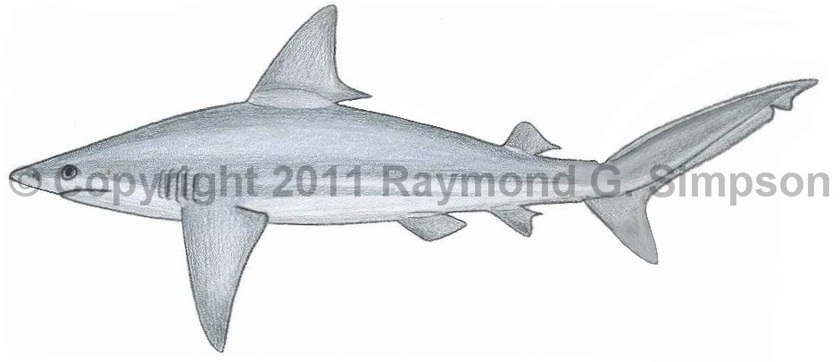
Common Name
Sandbar Shark
Year Described
Nardo, 1827
Identification
Anteroposterior tooth rows: 13-15/12-15 on each side; 28-32/27-32 total
Vertebrae: 82-97 precaudal, 152-189 total
A fairly large and robust shark with a short and bluntly rounded snout. Dorsal profile highly arched. Eye small. Distance between nostrils 0.9-1.3 times in pre-oral distance. Nasal flaps broadly triangular and low. Upper labial furrows short. Interdorsal ridge is present. Long preanal ridge absent. No keels on caudal peduncle. Gill slits short (2.4-3.7% TL). Teeth in upper jaws thick and triangular, with broad erect to oblique cusps. Lower jaw teeth broad-based, with narrow, erect cusps. First dorsal fin very high (8.4-15.0% TL) with an almost straight anterior margin, a angular tip, and inserted over the base of pectoral fin. Second dorsal fin much smaller (2.6-3.3% TL) and inserted almost directly above anal fin. Both dorsal fins with extended free posterior tips (second dorsal free tip less than twice height of second dorsal). Anal fin similar in size to second dorsal fin. Pelvic fin origin well behind free tip of first dorsal. Pectoral fin long and falcate, with a pointed tip.
Color
Gray to brown above, abruptly whitish below. Fins unmarked.
Size
Mature adults from 131-183cm TL. Newborns from 56-75cm. Maximum size to 239cm TL.
Habitat
Coastal to oceanic (1-280m) but mostly in shallower waters over soft bottoms. Sometimes in estuaries but not in low salinities.
Range
New England to S. Brazil, including the Gulf of Mexico and thr Caribbean Sea. Rarer around islands.
References
Castro, J.I. 2011. The Sharks of North America. Oxford University Press, 640 pp.
Compagno, L.J.V. 2002. Sharks. In: Carpenter, K.E. (Editor) FAO Identification Guide for Fishery Purposes. The Living Marine Resources of The Western Central Atlantic. Volume 1: Introduction, mollusks, crustaceans, hagfishes, sharks, batoid fishes, and chimaeras. ASIH Special Publication No. 5. FAO, Rome.
Compagno, L., M. Dando, and S. Fowler. 2005. Sharks of the World. Princeton University Press, 480 pp.